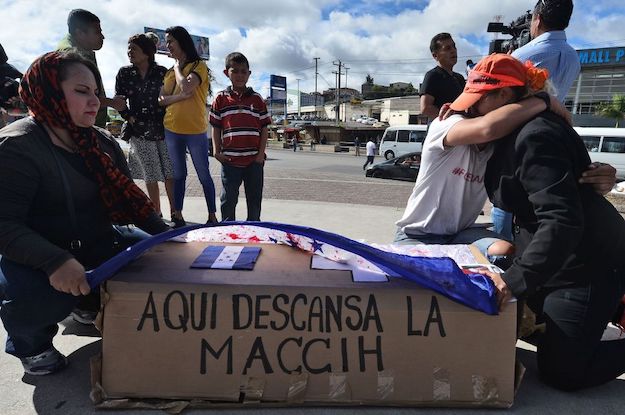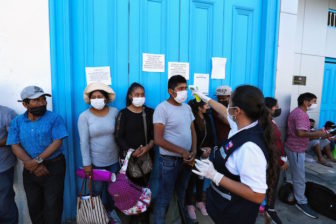One of the bolder claims in Donald Trump’s impeachment defense posits that the U.S. president withheld military aid to Ukraine out of genuine concern over corruption in the former Soviet republic, and not to extract an investigation into a political rival. The assertion might be more plausible were the White House not simultaneously contemplating revisions to the Foreign Corrupt Practices Act, which Trump has long derided as placing American businesses at an unfair disadvantage. Still, some U.S senators appear willing to entertain the president’s argument that combating corruption is at the core of his foreign policy.
If only Trump’s counterparts in Central America were as easily convinced of the president’s zeal for anti-corruption.
On Jan. 19, the government of Honduras allowed its mandate for the Organization of American States’ (OAS) anti-corruption mission in the country to expire. Created in 2016 to help Honduras prevent and prosecute corruption, the Mission to Support the Fight against Corruption and Impunity in Honduras (MACCIH) led an uncomfortable existence from the start. President Juan Orlando Hernández, who has denied allegations of ties to corruption and drug trafficking, agreed to the mission under domestic and international pressure – including from the Obama administration and both Republicans and Democrats in Congress. MACCIH endured a troubled tenure, but nonetheless forged an increasingly promising alliance with UFECIC, a special prosecutor’s office in Honduras’ Public Ministry. This cooperation resulted in the prosecution of 133 individuals in 14 separate cases and the conviction, among others, of a former first lady on fraud and embezzlement charges.
Accountability for high-level corruption, however incipient and fragile, was apparently not well received by some in Tegucigalpa. As MACCIH’s mandate came up for renewal, negotiations between the Honduran government and the OAS centered on the mission’s relationship with UFECIC and its ability to continue supporting criminal investigations, which the government sought to discontinue. The OAS apparently balked at this demand, and with negotiations at a stalemate, MACCIH’S mandate was allowed to expire.
If this all sounds familiar, it should. A similar series of events took place in neighboring Guatemala, where the UN’s highly effective International Commission Against Impunity in Guatemala (CICIG) closed its doors in September of last year. Not unlike the situation in Honduras, Guatemala’s since-departed former President Jimmy Morales became a staunch critic of CICIG when its investigations began to target his inner circle. Morales and his allies grew determined to shut down CICIG, and its mandate finally expired after more than a decade in Guatemala.
The premature deaths of Central America’s pioneering hybrid anti-corruption bodies speak to the resilience of corrupt networks and entrenched political interests in Guatemala and Honduras. But they also speak volumes about U.S. foreign policy under Trump, in which foreign corruption is sometimes invoked to gain leverage, but seldom out of sincere conviction.
For three decades after the Cold War, U.S. diplomats across administrations were charged with promoting the rule of law. The efforts to create CICIG (under the George W. Bush administration) and MACCIH (under the Obama administration) were successful examples of such diplomacy. Under Trump, some U.S. officials attempted to follow the script. Trump’s first secretary of state, Rex Tillerson, lauded CICIG in his only major speech on the Western Hemisphere. And the State Department’s leading Latin America hands called repeatedly for the renewal of MACCIH’s mandate.
Before shuttering their countries’ flagship anti-corruption bodies, the Hernández and Morales administrations must surely have weighed the potential ramifications from Washington against their instincts for self-preservation. So what went wrong?
Trump’s foreign policy has frequently been described as “transactional”– untethered to traditional alliances or principles, and focused on achieving immediate, narrow goals by trading (or withholding) something of value. For the leaders of Guatemala and Honduras, the art of the deal involved sizing up the transaction before them and calculating – correctly – that what the Trump administration valued most had little to do with combating corruption.
In the case of CICIG, the price of a change in U.S. policy was fairly cheap. Influential players were swayed by Guatemala’s decision to move its embassy in Israel to Jerusalem and maintain its recognition of Taiwan instead of China. A lobbying campaign in Washington helped sully CICIG’s reputation based on disproven allegations. The result was that while professional diplomats in the State Department’s bureaus for Western Hemisphere Affairs (WHA) and International Narcotics and Law Enforcement continued to argue the merits of CICIG, Morales effectively inoculated himself against any meaningful blowback for expelling the commission. The Guatemalan leader’s eagerness to meet Trump’s demands on immigration even garnered him an Oval Office invitation.
Likewise, Honduras’ leaders were under no illusions about the paramount importance of migration to the Trump administration. Even while U.S. diplomats scrambled to convince Hernández to renew MACCIH’s mandate in its final days, acting Secretary of Homeland Security Chad Wolf flew to Honduras and gushed about the “strong and productive bilateral relationship” with Hernández, who had earlier reached a so-called safe third country agreement that will allow the United States to return some asylum seekers to Honduras. Wolf made no public mention of the pending decision on MACCIH. Ten days later, the mandate expired, eliciting a critical tweet from WHA’s acting assistant secretary, but seemingly little else.
For the strong majority of citizens in Honduras and Guatemala who supported MACCIH and CICIG, the termination of the institutions’ mandates comes as a bitter blow. Their countries, already among Latin America’s worst performers on corruption and rule of law, will likely reap weaker institutions, less accountability and more graft as a consequence. But for the politicians who resented these bodies’ oversight, the tradeoffs with the Trump administration were a win, at least in the short term. The U.S. Congress, which has conditioned foreign assistance to the two countries on combating corruption, may prove less impressed. And the leading Democratic candidates for president have made combating corruption prominent in their foreign policy platforms. Playing Trump’s game, however effectively, may in time prove a liability for both democratic governance in Honduras and Guatemala and these countries’ relations with the United States.
—
Camilleri is director of the Peter D. Bell Rule of Law Program at the Inter-American Dialogue. Christie is a program assistant with the Peter D. Bell Program.








